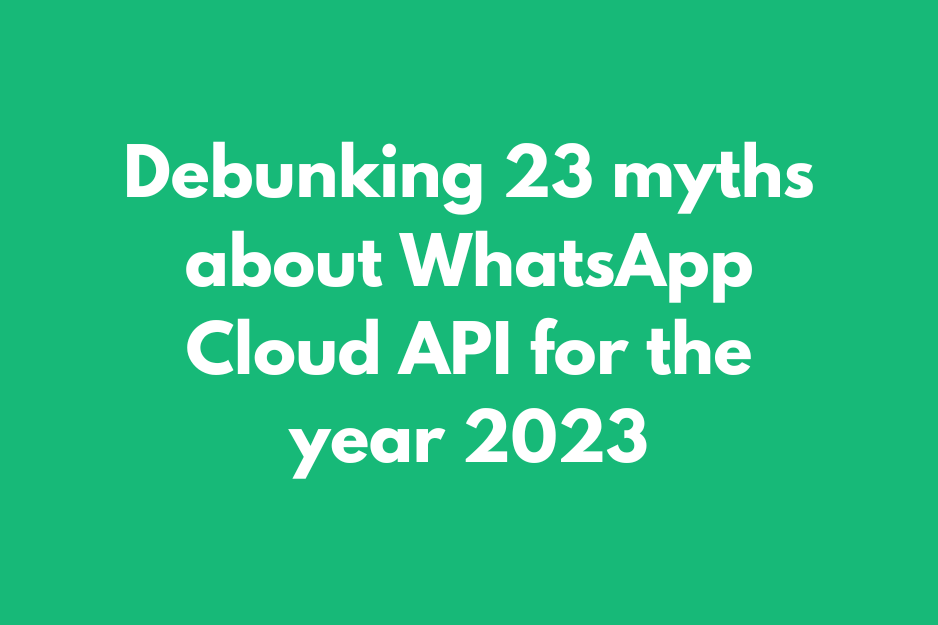Contents
- Myth #1: WhatsApp Cloud API is only for large businesses.
- Myth #2: WhatsApp Cloud API is difficult to set up.
- Myth #3: WhatsApp Cloud API is expensive.
- Myth #4: WhatsApp Cloud API can only send messages to customers who have opted to receive communication.
- Myth #5: WhatsApp Cloud API can only send text messages.
- Myth #6: WhatsApp Cloud API is only for one-way communication.
- Myth #7: WhatsApp Cloud API is not secure.
- Myth #8: WhatsApp Cloud API is only for customer support.
- Myth #9: WhatsApp Cloud API is only for WhatsApp users.
- Myth #10: WhatsApp Cloud API is not available in all countries.
- Myth #11: WhatsApp Cloud API is incompatible with other messaging platforms.
- Myth #12: WhatsApp Cloud API is not customizable.
- Myth #13: WhatsApp Cloud API is not reliable.
- Myth #14: WhatsApp Cloud API is not user-friendly.
- Myth #15: WhatsApp Cloud API is not flexible.
- Myth #16: WhatsApp Cloud API is only suitable for some industries.
- Myth #17: WhatsApp Cloud API is not compatible with CRM systems.
- Myth #18: WhatsApp Cloud API is not scalable.
- Myth #19: WhatsApp Cloud API is not suitable for marketing.
- Myth #20: WhatsApp Cloud API is not GDPR compliant.
- Myth #21: WhatsApp Cloud API is not compliant with other regulations.
- Myth #22: WhatsApp Cloud API is not available in different languages.
- Myth #23: WhatsApp Cloud API is not suitable for customer support.
- Zithara: The Complete WhatsApp Cloud API Platform
- FAQ's
WhatsApp Cloud API has become famous for businesses looking to improve customer communication and engagement. However, several myths and misconceptions surrounding the API may need clarification for companies considering it. Here are 23 myths about WhatsApp Cloud API and the truth behind them:

Myth #1: WhatsApp Cloud API is only for large businesses.
Many businesses may believe that WhatsApp Cloud API is only available to large companies with a high volume of messaging needs. However, this is different. WhatsApp Cloud API is a flexible and scalable solution that can be customised to meet the needs of businesses of all sizes and industries. Whether a business is small, medium, or large, it can benefit from the API's improved customer communication and engagement.
Myth #2: WhatsApp Cloud API is difficult to set up.
Some businesses may hesitate to use WhatsApp Cloud API due to concerns about the setup process. However, the API is actually relatively easy to set up. Companies can get direct approval from Facebook in just a few minutes, and platforms like Zithara can help businesses get started with the API quickly and easily. There is no need to worry about complex or time-consuming setup procedures when using WhatsApp Cloud API.
Myth #3: WhatsApp Cloud API is expensive.
Some businesses may be concerned about the cost of using WhatsApp Cloud API. However, the API is a cost-effective solution for business companies to improve customer communication. Some providers may offer free access on a limited basis, and businesses can also choose a plan that fits their budget and needs. The long-term benefits of using WhatsApp Cloud API, such as increased customer satisfaction and efficiency, can also help offset any costs associated with the API.
Myth #4: WhatsApp Cloud API can only send messages to customers who have opted to receive communication.
Some businesses may think they can only use WhatsApp Cloud API to send messages to customers who have explicitly agreed to receive communication. However, this is different. WhatsApp Cloud API can only send messages to customers who have added the business as a contact and agreed to receive notifications. Companies need to follow Whatsapp's marketing communications guidelines, which include obtaining customer opt-ins before sending messages.
Myth #5: WhatsApp Cloud API can only send text messages.
Many businesses may assume that WhatsApp Cloud API is limited to sending text messages only. However, this is different. The API can send various message types, including text, image, audio, and video. This allows businesses to communicate with customers in multiple ways and can help improve the customer experience. Companies can also use the API to send customised messages, add lists, quick replies, CTA buttons, and more.
Myth #6: WhatsApp Cloud API is only for one-way communication.
Some businesses may think that WhatsApp Cloud API can only be used for one-way communication, such as sending customer updates or promotions. However, the API can also be used for two-way communication. Businesses can use the API to send customers messages and receive and respond to customer inquiries and requests. This allows for real-time communication and customer engagement, which can improve customer satisfaction and loyalty.
Myth #7: WhatsApp Cloud API is not secure.
Some businesses may have concerns about the security of using WhatsApp Cloud API for customer communication. However, the API is designed for safety and complies with industry standards. Businesses can trust that their customer communication is protected through the API.
Myth #8: WhatsApp Cloud API is only for customer support.
While WhatsApp Cloud API is an excellent tool for customer support, it can also be used for various other purposes. Businesses can use the API for marketing, sales, and customer communication. The highly customizable API can be tailored to meet a business's needs and goals.
Myth #9: WhatsApp Cloud API is only for WhatsApp users.
Some businesses may think that WhatsApp Cloud API can only be used to communicate with customers who use WhatsApp. However, this is different. The API is designed to be used with WhatsApp, but businesses can also use it to communicate with customers through other channels, such as email or SMS. This allows companies to reach a wider audience and provide a consistent customer communication experience.
Myth #10: WhatsApp Cloud API is not available in all countries.
While WhatsApp Cloud API is widely available, it may only be available in some countries. It is recommended to check with the provider or a specialist for availability in specific regions.
Myth #11: WhatsApp Cloud API is incompatible with other messaging platforms.
Some businesses may think WhatsApp Cloud API is incompatible with other messaging platforms, such as Facebook Messenger or SMS. However, this is different. The API can be integrated with other messaging platforms to provide a seamless customer communication experience. This allows businesses to reach customers on their preferred channel and provide a consistent experience across all platforms.
Myth #12: WhatsApp Cloud API is not customizable.
Many businesses may assume that WhatsApp Cloud API is not customizable and can only be used in a limited way. However, this is different. The highly customizable API can be tailored to meet a business's needs and goals. Companies can use the API to send customised messages, add lists, quick replies, CTA buttons, and more. The API is also integrated with platforms like Zithara, which offers additional customisation options and features.
Myth #13: WhatsApp Cloud API is not reliable.
Some businesses may hesitate to use WhatsApp Cloud API due to concerns about reliability. However, the API is designed to be reliable and provide a consistent customer communication experience. Businesses can trust that the API will deliver messages to customers on time and ensure that customer communication is not disrupted.
Myth #14: WhatsApp Cloud API is not user-friendly.
Some businesses may think WhatsApp Cloud API is difficult to use or navigate. However, this is different. The API is designed to be user-friendly and easy to use, even for businesses with little technical expertise. Companies can use the API to send messages and engage with customers without complex setup or maintenance requirements.
Myth #15: WhatsApp Cloud API is not flexible.
While WhatsApp Cloud API is a powerful tool for businesses, some may believe it needs to be more flexible and adapt to meet changing needs or goals. However, this is different. The API is highly flexible and can be customised to meet the evolving needs of a business. Businesses can send text, images, audio, and video messages using the API. They can also customise the content and format of letters to meet their specific needs.
Myth #16: WhatsApp Cloud API is only suitable for some industries.
Some businesses may think that WhatsApp Cloud API is only suitable for specific industries or companies. However, this is different. The API is a versatile and flexible solution that can be used by businesses in any industry. Whether a business is in retail, healthcare, finance, or any other sector, it can benefit from the API's improved customer communication and engagement.
Myth #17: WhatsApp Cloud API is not compatible with CRM systems.
Some businesses may be concerned that WhatsApp Cloud API is incompatible with customer relationship management (CRM) systems. However, this is different. The API can be integrated with various CRM systems to provide a seamless customer communication experience. Businesses can use the API to automate notifications, such as order confirmations, shipping updates, and payment reminders. They can also use the API to manage customer interactions and data in a central location.
Myth #18: WhatsApp Cloud API is not scalable.
Some businesses may think that WhatsApp Cloud API is unsuitable for companies that expect to grow or have high messaging needs. However, this is different. The API is designed to be scalable and can handle a high messaging volume without any issues. Businesses can use the API to send messages to thousands of customers in one go and customise the API to meet their specific messaging needs as they grow.
Myth #19: WhatsApp Cloud API is not suitable for marketing.
While WhatsApp Cloud API is primarily used for customer support and engagement, it can also be an effective tool for marketing. Businesses can use the API to send promotional messages, such as coupons or special offers, to customers who have opted in to receive marketing communication. The API can also be used to send personalised messages based on customer preferences or behaviour, which can help improve the effectiveness of marketing efforts.
Myth #20: WhatsApp Cloud API is not GDPR compliant.
WhatsApp Cloud API is compliant with data protection regulations, including the GDPR. Businesses can trust that the API follows the best data security and privacy practices and that customer data is handled according to relevant laws and regulations. Companies can also use the API to manage customer data and interactions in a way that meets their specific compliance requirements.
Myth #21: WhatsApp Cloud API is not compliant with other regulations.
While WhatsApp Cloud API complies with data protection regulations, such as the GDPR, some businesses may be concerned about compliance with other industry-specific laws. However, the API is designed to comply with various rules and can be customised to meet the specific compliance needs of a business.
Myth #22: WhatsApp Cloud API is not available in different languages.
Some businesses may think that WhatsApp Cloud API is only available in English. However, this is different. The API is available in various languages, allowing businesses to communicate with customers in their preferred language. This can improve the customer experience and make it easier for companies to reach a wider audience.
Myth #23: WhatsApp Cloud API is not suitable for customer support.
While WhatsApp Cloud API is an excellent tool for customer support, some businesses may think it needs to be more suitable. However, this is different. The API is designed for customer support, and companies can use it to send messages and respond to customer inquiries in real-time. This can help improve customer satisfaction and loyalty and make it easier for companies to handle customer support inquiries efficiently.
Zithara: The Complete WhatsApp Cloud API Platform
A platform like Zithara can significantly simplify getting and using WhatsApp Cloud API for businesses. Here are some ways that Zithara can help:
Quick and easy approval process: Zithara can help businesses get approved for WhatsApp Cloud API in minutes without going through intermediaries or Business Service Providers (BSPs). This allows companies to start using the API quickly and easily.
Customisation options: Zithara offers a range of customisation options that can help businesses tailor the API to meet their specific needs and goals. This includes sending various message types, adding lists, quick replies, CTA buttons, and more.
Integration with CRM systems: Zithara can help businesses integrate WhatsApp Cloud API with their customer relationship management (CRM) systems, which can streamline customer communication and data management.
Scalability: Zithara is designed to handle a high volume of messaging, meaning businesses can use the API to send messages to thousands of customers in one go without any issues. This makes it easy for companies to scale their messaging needs as they grow.
User-friendly platform: Zithara is designed to be user-friendly and easy to use, even for businesses with little technical expertise. This makes it easy for companies to start with the API and communicate with customers immediately.
Overall, using a platform like Zithara can significantly simplify the process of getting and using WhatsApp Cloud API for businesses and can help companies to take full advantage of the benefits of the API.
Conclusion:
WhatsApp Cloud API is a powerful tool to help businesses improve customer communication and engagement. Despite some common misconceptions, the API is available to companies of all sizes and industries, is easy to set up and use, and is customizable and scalable to meet a business's specific needs and goals. Additionally, the API is secure, reliable, compliant with data protection regulations, and available in various languages. Companies can use WhatsApp Cloud API for customer support, marketing, and other purposes to reach customers on their preferred channel and provide a consistent customer communication experience.
FAQ's
Q: What is WhatsApp Cloud API?
A: WhatsApp Cloud API is a cloud-based version of the WhatsApp Business API that allows businesses and developers to build on top of WhatsApp and customise their experiences.
Q: Is WhatsApp Cloud API different from WhatsApp Business API?
A: Yes, WhatsApp Cloud API is a newer version of the WhatsApp Business API that allows businesses to get direct approval from Facebook and avoid going through intermediaries or Business Service Providers (BSPs).
Q: Can any business use WhatsApp Cloud API?
A: Yes, WhatsApp Cloud API is available to businesses of all sizes and industries.
Q: How do businesses get approval for WhatsApp Cloud API?
A: Businesses can get directly approved for WhatsApp Cloud API from Facebook, allowing a quick and easy approval process.
Q: Would you happen to know if WhatsApp Cloud API can be customised?
A: Yes, WhatsApp Cloud API is highly customizable and can be tailored to meet a business's specific needs and goals.
Q: Can WhatsApp Cloud API be integrated with CRM systems?
A: WhatsApp Cloud API can be integrated with various customer relationship management (CRM) systems to provide a seamless customer communication experience.
Q: Is WhatsApp Cloud API scalable?
A: Yes, WhatsApp Cloud API is designed to be scalable and handle a high messaging volume without issues.
Q: Can WhatsApp Cloud API be used for marketing purposes?
A: Yes, WhatsApp Cloud API can be used for marketing purposes, such as sending promotional or personalised messages based on customer preferences or behaviour.
Q: Is WhatsApp Cloud API compliant with data protection regulations?
A: WhatsApp Cloud API complies with data protection regulations, including the General Data Protection Regulation (GDPR).
Q: Is WhatsApp Cloud API suitable for customer support?
A: Yes, WhatsApp Cloud API is an excellent tool for customer support and can be used to send messages and respond to customer inquiries in real time.

